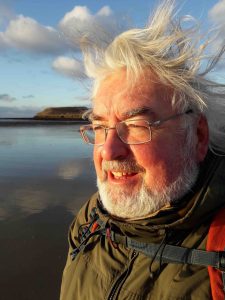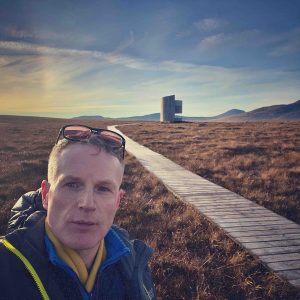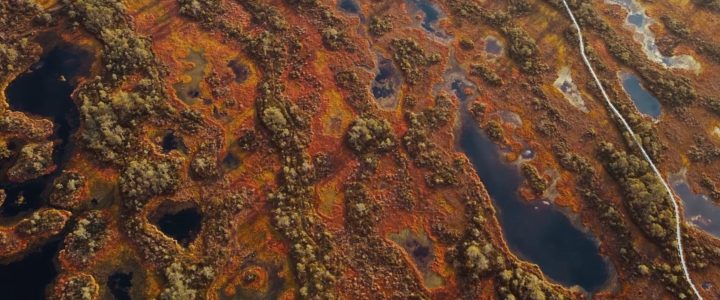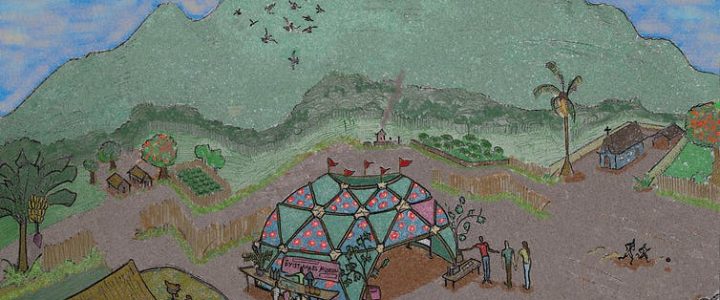A new film that aims to highlight the unique story of a landscape of Northern Scotland will have its maiden screening in Lairg.
The Dreaming Bog is an ecopoetic story on Climate Change told through the lens of the Bogs & Peatlands of Northern Scotland and the Mires & Swamps of Finland. The film is based on the opening act of an epic new poem by Caithness Makar, George Gunn, ’Six Thousand Years of Sunlight’, and was produced by Sutherland born filmmaker, Robert Aitken.
The film seeks to seed a new wave of discussion on Climate Change where humans are placed back into the heart and narrative of nature, and honour that place. Although a complete telling, the film has been created as the opening of 4 x films continuing an ecopoetic discourse and engagement with the remaining stanzas of George Gunn’s modern epic.
As George says; “I was honoured when Robert wanted to use some of my poem for his new film, ‘The Dreaming Bog’. The subject matter of the Caithness and Sutherland Bog lands is very close to my heart given the Clan Gunn literally, culturally and historically, come out of the Bog.

Filming took place at the end of 2021 under challenging circumstances. As Robert explains; “After a difficult birth including; a pandemic, a lock down, two storms and multiple cancellations due to Covid and illness, it’s just incredible The Dreaming Bog got made at all. Given events elsewhere in the world however I give gratitude that I could create this film. In a strange way the challenges in production echo the wider situation and how we can overcome adversity.”
The global Bogs and Peatlands are an incredible gift of life, but are in danger of degradation through human-related activities. These places are home to an immense variety of plants and wildlife, and historically, humankind has lived and worked in the Bogs of northern Scotland since the arrival of hunter-gatherer. Arguably the greatest gift of certain Bog types is that they are the best Carbon Keepers on earth, up to four times more efficient at storing gas, poisonous to human life, than the rain forests.
The Dreaming Bog also contains heartfelt comment from those who actually live and work in the Bogs of Caithness and Sutherland, as well as Finland – informed testimony from passionate researchers, heritage curators and scientists, all who have delved deep in to the legacy of the Peatlands and their rich story.
Writer, ethnologist and archaeologist Cáit O’Neill McCullagh says; “As a landscape of course the Peatbogs preserve a tremendous amount of archaeology because It’s an anaerobic environment, an oxygen free environment. The Bogs of Northern Europe are well known as places where people would have deposited important things for ritual purposes. Hoards of expensive precious metals, materials that would have been fashioned in to swords or cauldrons but also for simply preserving things like you or I would put things in the fridge.”
Heritage and Digital curator at Timespan Arts in Helmsdale, Jacquie Aitken, continues on the theme of preservation; “Wood was not readily available to the township folk of far north of Scotland so they would have gone up to the Bogs and dug up Peat as fuel. They’d also come across old roots of trees preserved in the Bogs. It’s these hard bits of wood that they would utilise and make furniture out of, such as chairs. It’s a wonderful example of vernacular furniture that’s been derived from the Peatbogs.”
Other footage and comment was supplied by film partners from the University of Eastern Finland’s Mire Trend Project. With Finland’s landmass being one-third swamps, the Mire Trend Project looks at various influences of swamps and Bogs on Finnish society.
The topic of Climate Change is very much at the forefront of the global energy crisis with concerns on our reliance on fossil fuels versus the need for deliverable renewables. For the most part planet earth has paid little attention to human civilisation over the past 6000 years. Only since the industrial revolution has this relationship fractured; a mere 200 years and earth has seen its air, water, ice and rock begin to act directly due to human activities. As Robert says; “We all want the human journey to continue but our efforts thus far have failed. Adding Robert says; “Getting a message out there with a narrative that connects with people requires a different approach. It’s ultimately humanity that needs to change so I do find a lot of the messaging and terminology in the current arguments a barrier to any real progress. In short, we need a new story.”
Social scientist at UHI’s Environmental Research Institute in Thurso, Magnus Davidson, comments on his work on the Caithness Peatlands, known locally as the Flow Country; ”I try to understand the social history of the Flow Country, to better understand how we as a society might use the Flow Country in the future, but also understand the environmental degradation and as we look to restore the environment around it.”It’s this need for a new perspective on Climate Change that led Robert to make this film on the global Bogs. Given the importance to our past and current existence on earth the Bogs act like a planetary storage facility, physically and metaphysically. Due to the chemical make-up of the vegetation the Bogs hold a geological record of earth from millennia ago and act as a depository of our activities; a living and breathing vast record of our collective actions on earth.
The producers of The Dreaming Bog are keen for as many people as possible to see the film, listen to the panel discussion and get involved in the Q&A sessions. As Robert surmises; “The film is only half the story, we want host venues and the public to get involved and be participants. The film will also make a great addition to festivals, climate change and arts related activity venues may be planning with its themes around vulnerable landscapes, poetry, heritage & culture and its highly creative approach in storytelling.”

There are already a number of venues throughout the far North and Scotland signed up as part of a national screening tour of The Dreaming Bog. The film is now being offered to museums, arts venues, community organisations etc., of all sizes to host a screening event. To help host venues with costs the producers are wavering all film licensing fees and some other costs. They also offering help with advertising and promoting to ensure a successful screening event. In concluding Robert says; “I am so delighted we are kicking off our screening tour in Lairg, the region of my birth and of course not far from the precious Bogs. They are an incredible and hugely important landscape facing an uncertain future. It’s this story we have endeavoured to tell in The Dreaming Bog.”
If you wish to host a film screening event or receive more information of The Dreaming Bog please get in touch with Robert Aitken on: robert@aitken.online
For news and dates of live screenings of The Dreaming Bog please visit:
https://www.facebook.com/thedreamingbog
#thedreamingbog
#thedreamingbogfilm


